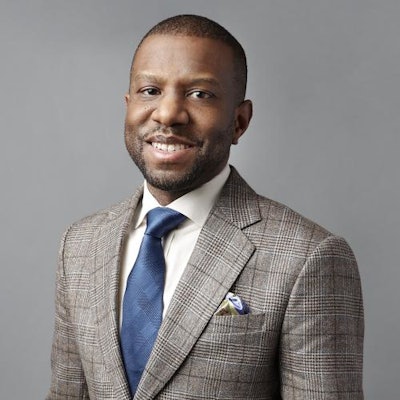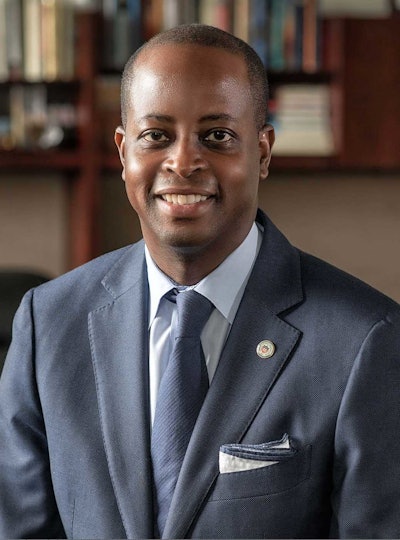About 30% of African American STEM professionals begin their higher education at a Historically Black College or University, according to the United Negro College Fund, but only around 1% of the Defense Department’s research funding is directed towards HBCUs and other minority serving institutions.
This week, the U.S. government took a major step towards remedying these disparities by awarding a five-year $90 million contract to create a university affiliated research center (UARC) to Howard University, one of the largest HBCUs in America. It is the first UARC to be led by an HBCU, and, according to officials at Howard and in the military, the largest research contract ever to be awarded to an HBCU.
 Dr. Ivory Toldson, national director of education innovation and research for the National Association for the Advancement of Colored People and professor of counseling psychology at Howard
Dr. Ivory Toldson, national director of education innovation and research for the National Association for the Advancement of Colored People and professor of counseling psychology at Howard
According to Toldson, HBCUs have a long and unjust history of being overlooked for research and military contracts due to systemic biases in the awards process. This pattern favors larger, better-funded institutions with greater public awareness, creating significant disparities.
The Howard contract is the result of a conscious effort by the Department of Defense to address these disparities. The Department of Defense had announced a plan to create a UARC affiliated with an HBCU last June. Howard was the unanimous choice out of the four applicants, all of which were strong, according to the Air Force, which is funding the UARC.
The UARC will center on tactical autonomy, or systems that can operate by themselves. One focus will be on trust of autonomous systems by humans. It’s a relationship that has to be built, said Tim Williams, program manager for tactical autonomy for the UARC, comparing the current situation to Americans’ anxiety at using automated elevators when they first were developed. Another emphasis will be on how humans and machines can work together to take advantage of what each are best at.
It's work that Howard is well-positioned to take on, with 15 doctoral students and two master’s-level students researching autonomous systems and machine learning. Howard had previously received a grant from the Department of Defense in 2020 of $7.5 million to create a Center of Excellence in Artificial Intelligence and Machine Learning and had previously partnered with a UARC focusing on intelligence and security at the University of Maryland, College Park.
Besides the research, the military also wanted to be able to hire a more diverse group of workers, according to Dr. Victoria Colman, Chief Scientist of the Air Force.
“HBCUs contain huge talent that today is not accessible to us,” she said. “This is an attempt to build a broader, deeper, long-lasting partnership with the HBCU community so that the talent pool that they host is connected.”
The UARC will also involve programs for K-12 students (Howard has a STEM middle school on campus) intended to encourage them towards careers in artificial intelligence, tactical autonomy, and machine learning. Undergraduate and graduate students will participate in the UARC’s research as well.
However, Howard will not be doing all the work alone. Rather, it will lead a consortium of 8 HBCUs that will be part of the UARC’s infrastructure. The HBCUs involved are Jackson State University, Hampton University, Tuskegee University, Bowie State University, Delaware State University, Florida Memorial University, Norfolk State University, and Tougaloo College. Students involved in UARC research will have the chance to receive full funding for their education up to the Ph. D level at any of the consortium schools.
 Dr. Wayne A. I. Frederick, president of Howard University
Dr. Wayne A. I. Frederick, president of Howard University
“This would give us a very strong opportunity the next time the classifications come out in 2024,” said Frederick. “We’ve been on track to get there, and I think this helps us get there sooner and more confidently.”
The contract will also help Howard build out infrastructure and attract more donations, Frederick said.
UARCs have not always been celebrated when they’ve been announced, however. At the University of Hawaii, protestors occupied President David McClain’s office for a week in 2005 to protest a potential UARC sponsored by the Navy, criticizing what they described as the militarization of the university.
According to Toldson, how the UARC is handled will be important.
“It is important for both parties to ensure that the contract is managed in an open and responsible manner, engaging with stakeholders to address any potential issues,” he wrote.
No protests have erupted at Howard, however. Instead, there is pride and a desire to show what an HBCU can do.
“We’re very happy at Howard to be given the imprimatur of faith in what we can do,” said Frederick, “and our intent is to deliver.”
Jon Edelman can be reached at [email protected].





















